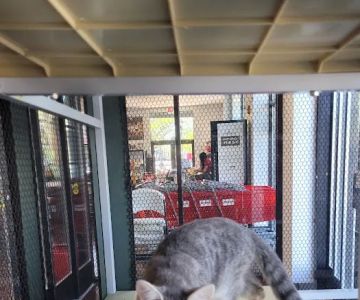How to Prevent Dental Disease in Pets
As a pet owner, one of the most important aspects of your furry friend's health is their oral hygiene. While it’s easy to overlook, dental disease in pets can lead to severe health issues, including heart disease, kidney problems, and even loss of teeth. Fortunately, preventing dental disease in pets is simpler than most people think. In this article, I’ll share essential tips on keeping your pet’s teeth and gums healthy, ensuring that they live a long and happy life.
1. Regular Brushing for Pet Oral Hygiene
The most effective way to prevent dental disease in pets is by regularly brushing their teeth. I know what you're thinking—brushing your dog's teeth or your cat’s teeth might sound impossible. But trust me, it’s worth the effort! The sooner you start, the more your pet will get used to the process. It doesn’t take much time—just a few minutes every day or at least a few times a week can significantly reduce plaque and tartar build-up.
Use a toothbrush and toothpaste designed specifically for pets. Human toothpaste contains ingredients that can be harmful to animals. A pet-specific toothpaste will not only clean their teeth but also have flavors they enjoy, such as poultry or peanut butter, making the experience much more enjoyable for them.
2. Provide Chew Toys and Dental Treats
Chew toys and dental treats are another excellent way to help keep your pet’s teeth clean. These items are designed to scrape off plaque and massage your pet's gums while they chew. Some dental chews even have added ingredients that help fight bad breath and prevent the buildup of tartar. I always recommend choosing toys or treats that are vet-approved, as they are safe and effective. Plus, they provide mental stimulation, which is beneficial for your pet’s overall well-being!
For dogs, durable rubber chew toys or treats that target dental health can be a lifesaver. For cats, dental treats or specially designed chew toys can also help maintain their oral health.
3. Regular Vet Check-ups
One of the best ways to prevent dental disease in pets is through regular veterinary check-ups. During these visits, the vet will examine your pet’s teeth and gums, identifying any early signs of dental issues. Catching problems early can help avoid costly treatments down the line. In some cases, your vet may recommend a professional cleaning, which is especially useful if plaque and tartar have already built up. Regular check-ups will ensure that your pet's oral health is monitored, and you’ll be able to address issues before they become severe.
4. Diet and Nutrition
The food your pet eats can have a significant impact on their oral health. Certain types of food can help reduce plaque build-up and support healthy gums. For instance, dry kibble can help scrape away food particles and plaque from your pet’s teeth. On the other hand, wet food can leave more residue that contributes to plaque formation.
Another great option is specially formulated dental diets or treats that are designed to clean teeth while providing nutrition. These diets often contain ingredients that reduce tartar and promote oral health. I always recommend talking to your vet to determine the best food options for your pet’s specific needs.
5. Watch for Warning Signs of Dental Disease
It’s crucial to be aware of the warning signs of dental disease in pets. Common symptoms of dental problems include bad breath, difficulty eating or chewing, excessive drooling, red or swollen gums, and discolored teeth. If you notice any of these signs, it’s important to schedule a visit to the vet. The sooner dental problems are caught, the easier they are to treat, and your pet won’t suffer from unnecessary pain.
6. Water Additives for Oral Health
If your pet isn’t a fan of having their teeth brushed, water additives are a great alternative. These products can be added to your pet’s water bowl to help reduce plaque and bacteria in their mouths. They’re easy to use, and many pets don’t even notice the difference in their drinking water. While they’re not a replacement for brushing, they can be a great supplemental method for maintaining oral health between cleanings.
7. Professional Dental Cleanings
Even with regular at-home care, pets sometimes need professional dental cleanings. A professional cleaning by a vet involves scaling the teeth to remove tartar and polishing them to prevent further plaque build-up. This procedure is typically done under anesthesia, so it’s essential to follow your vet’s instructions regarding pre-procedure care.
Professional cleanings are often necessary for pets who are at a higher risk of dental disease, such as older pets or those with a history of dental issues. Your vet can guide you on when and how often your pet may need a professional cleaning.
8. Alternatives to Brushing
If brushing your pet's teeth seems impossible, there are other alternatives. Chew toys, dental treats, and water additives can help reduce plaque and tartar. In some cases, dental wipes can also be an option for cleaning your pet’s teeth. These wipes are designed to wipe down your pet’s teeth, helping to remove plaque and tartar with minimal effort.
Ultimately, the best approach to preventing dental disease in pets involves a combination of methods. Regular brushing, providing chew toys and dental treats, keeping up with vet check-ups, and maintaining a healthy diet all contribute to your pet’s oral health. Your pet’s smile will thank you, and their overall health will benefit from the care you provide!
If you're looking for expert veterinary care, visit Hidden Brook Veterinary for personalized dental services and advice tailored to your pet's needs. Their team can help you choose the right care options to keep your pet’s teeth healthy and prevent dental disease.











